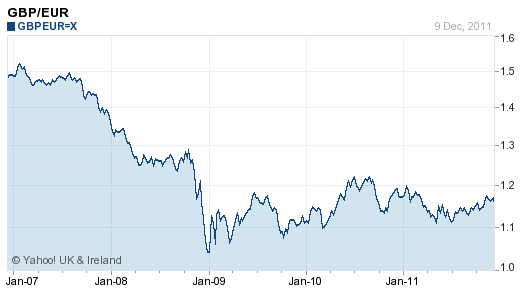The UK and the Eurozone in the shifting global economy
- By Danny Quah
 0 Comment(s)
0 Comment(s) Print
Print E-mail
China.org.cn, December 19, 2011
E-mail
China.org.cn, December 19, 2011
The UK's Economic Research Council invited me to represent LSE in a panel discussion on near-term prospects for the UK economy. Lord Norman Lamont, 1990-1993 Chancellor of the Exchequer, chaired. The other panelists were Prof John Muellbauer from Oxford and Prof Hashem Pesaran from Cambridge. The venue? The Royal Institution of Great Britain's Faraday Lecture Theatre, where in 1825 the first of the Royal Institution Christmas Lectures were delivered.
I argued the following.
First, the economic difficulties in the UK or the Eurozone cannot be usefully analysed without looking at these economies' positions in the world. Second, the UK and the Eurozone have an immediate problem with debt and an ongoing problem with productivity. It is unlikely that Keynesian aggregate demand management alone will lead to long-run sustained growth.
What are the facts on the UK and the Eurozone in the global economy? Time was, the night-time sky was lit up pretty much just by the Transatlantic Axis.
 |
|
The Transatlantic axis in the night time sky (via NASA) |
But that was 30 years ago, and the global economy has moved on. By 2010 the world's economic centre had shifted 5,000 km — three-quarters of the Earth's radius — from the rise of the east, notably India and China.
The great fhift east
As a consequence, hundreds of millions of Asians have been lifted out of grinding poverty; soon these people will be the world's middle income class.
That figure of the Great Shift East takes in grubby calculations with thousands of datapoints. But its point can be appreciated in many different ways, some more vivid than others (e.g., view from the US).
To be clear, not all Europe needs help in the same way. By the summer of 2011, a distinguished US economist had related to me how he and colleagues were surprised by German economic growth out of the 2008 Global Financial Crisis since, while keeping its traditional high-savings habits, Germany had its export markets — the US, the rest of the EU — mired in ongoing recession. Here, however, might be part of how Germany did it:

Evolution of Germany's export markets
The great bulk of German trade remains, naturally, with the rest of the European Union. But the EU is now deep in recession and likely to remain so for some time. Outside the EU? Germany today exports more to Developing Asia than it does to the US. And that gap continues to rise. Exports to China alone already appear as large as those to the US. Part of this obviously stems from US imports sharply falling right after 2008 — but that is exactly my point. China and Developing Asia continued to grow, continued to import from Germany (and elsewhere), and thus continued to keep parts of the global economy afloat throughout both the global financial and European sovereign debt crises.
 |
|
The Euro-sterling exchange rate |
This is not just because Germany enjoyed a cheap currency. Despite the weakness of pound sterling against the Euro, the UK has not re-oriented its exports anywhere as successfully as has Germany:
 |
|
Evolution of UK's export markets |
Unpack the numbers further by breaking out the UK's 50 largest trading partners in 2009: the UK had 56% of its exports go to the 10 slowest-growing economies in that group (growth measured 2000-2008). Across these 50, the correlation between exports and growth was -0.32: the UK systematically exported more to those trading partners growing slower.





